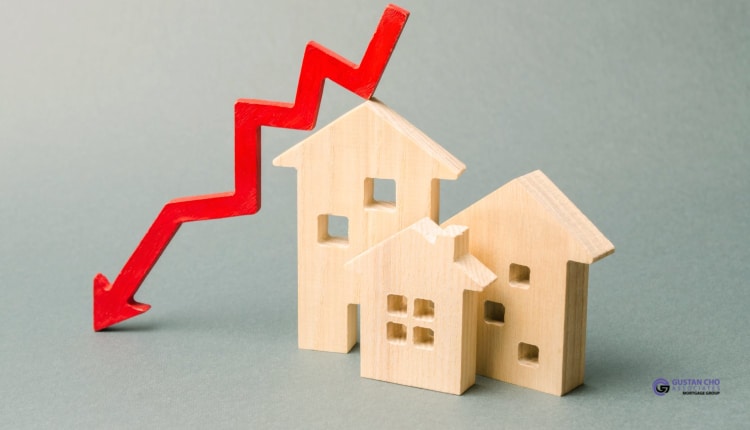How Interest Rates Affect The Housing Markets In 2024
In this blog, we will be talking about how interest rates affect the housing markets. The team at Gustan Cho Associates is constantly monitoring the health of the mortgage market. If you have been following the news, there have been many recent updates surrounding the housing market and the overall financial markets.
In this blog, we will give you a brief update on the current state of the mortgage market and our predictions of where we feel the housing market may go. This article can be very important if you are about to start the homebuying process or are already in the home-buying process. In the following sections, we will cover how interest rates affect the housing markets.
Do Higher Mortgage Rates Mean Lower Housing Prices?
Higher mortgage rates can potentially lead to lower housing prices, but the relationship between mortgage rates and housing prices is not always straightforward and can vary depending on various factors.
However, it’s important to note that the correlation between mortgage rates and housing prices doesn’t always follow a straightforward pattern, and other factors can influence housing market dynamics. Factors such as local market conditions, economic trends, housing supply levels, and demographic factors also play significant roles in determining housing prices.
Additionally, while higher mortgage rates may put downward pressure on housing prices in the short term, they can also be indicative of a stronger economy, which can support overall housing market stability and long-term price appreciation. Therefore, the impact of higher mortgage rates on housing prices should be analyzed within the broader economic and market context.
What Happens To The Housing Market With Low Mortgage Rates?
This move was designed to encourage Americans to borrow utilizing home loans as well as other personal loans. This created a substantial refinance boom and the 30-year fixed mortgage dropped below 3%. Since then, America has recovered from the COVID-19 coronavirus outbreak, and we are now in completely different economic times. It is common knowledge that inflation is at record highs.
Historically speaking, times of high inflation are accompanied by higher interest rates. Since higher interest rates mirror high inflation, the most recent inflation report showed overall inflation at 9.1% year over year. We have seen mortgage interest rates rise for eight consecutive months.
What Happens If You Buy House During Inflation?
Buying a house during a period of inflation can have various positive and negative implications, depending on individual circumstances and market conditions. We should consider individual financial circumstances, housing market conditions, and long-term investment goals.
While inflation can present challenges for homebuyers, it can also create opportunities for those who strategically navigate market conditions and plan for potential risks. Seeking guidance from real estate experts and financial advisors can assist prospective buyers make informed decisions in an inflationary environment.
Inflation and the Housing Market
The federal reserve is a government body that does not increase interest rates searching for profit. The Federal Reserve Board raises interest rates in an attempt to lower inflation. Basic economics will tell you; that consumers spend less money when it costs more to borrow, which in theory, will lower inflationary pressures. While the short-term federal funds rate was at 0% during the height of the pandemic, the federal reserve has now raised the short-term federal funds rate to 1.5%.
Should I Buy a House With Inflation on the Rise?
Doesn’t sound like much, but the federal reserve has indicated that they plan to raise the short-term federal funds rate to 3% by the end of the year. They have also hinted that they may increase the short-term federal funds rate all the way to 5% in 2023. This can really put the brakes on the economy.
At this point, I would like to ask readers this question, with the current rate hikes, have you felt any changes with inflation? As of now, household spending has slowed down but has remained consistent with previous months. At this point, all I have noticed is the cost of gas, groceries, technology, and most other items increase in price.
What Would Cause Home Prices To Drop?
This has created many home listings to drop their price. Seeing price reductions while searching for homes online is something we have not seen in quite some time. However, it is becoming more and more common across the nation. This should not come as a surprise. The federal government has been very open and honest about trying to slow down the economy with a strong focus on the housing market. Unfortunately, this hurts consumers who are in the process of trying to buy a home.
How Interest Rates Affect The Housing Markets on New Construction Homes
There are even Americans who are in the process of building a new construction home and no longer qualify for that home because of the sharp rise in interest rates. With the recent announcement from the federal reserve raising the interest rate by 75 basis points once again on July 27, 2022, we see even more ripples in the housing market. This most recent increase will put the average 30-year fixed mortgage near 7%. This has not happened in many years.
Is Now a Good Time To Buy a House?
While you may hear some older Americans state they have paid well over 15% mortgage interest in the past, homes were never as expensive as they are today. The housing market has been incredibly hot since the start of the pandemic. Home values across the nation have
skyrocketed. Many areas of the country saw well over 20% growth year over year from 2019 to 2020. And significant appreciation from 2020 to 2021.
Has The Housing Market Cooled Off?
While the rapid appreciation has cooled off in the past few months in 2022, home values are still historically high. When you take the high cost of a home accompanied by increased interest rates, you strangle many Americans out of affording a home. The mortgage market volume has dropped significantly as the refinance boom is officially over. When interest rates drop as they did at the beginning of the COVID-19 coronavirus pandemic, Americans all over the nation refinance their homes to save money on a monthly basis.
Advantages of Low Mortgage Rates For Homebuyers
Paying less in interest would help them pay off their home faster along with many other benefits of refinancing. In today’s rising right environment, basic data will show you that refinance applications are down dramatically since this same time a year ago. The current market conditions will force lenders to stay highly competitive and prepare for a downturn. Many mortgage companies have laid off a considerable number of mortgage-related employees. These layoffs are industry-wide, and some large banks are trimming their workforce in significant
numbers.
Interested with these Advantages of Low Mortgage Rates For Homebuyers? Click here.
How Interest Rates Affect The Housing Markets and Economy
A look at the future of the mortgage market My personal belief is the mortgage market is going to slow down substantially for the remainder
of the year. With all the interest rate hikes and inflation across our country, Americans are tightening their budgets more than ever. Many Americans who may have had down payment funds available are forced to spend those funds on everyday items such as gas and groceries.
Many Americans have decided to put their home search off for the time being. What they may not understand is rents are also going to increase at an alarming rate.
Is Buying an Investment Property a Good Investment in 2024?
Determining the viability of buying an investment property as a good investment in 2024 involves considering various factors, including market conditions, financial objectives, and individual circumstances. Assessing the viability of acquiring an investment property is a sound investment in 2024 depends on your individual investment objectives, risk tolerance, financial situation, and the prevailing market conditions. Conduct thorough research, perform due diligence, and carefully evaluate investment opportunities to make informed decisions that align with your investment goals and objectives.
How Interest Rates Affect The Housing Markets and Property Taxes
It has been a long time since I have seen property taxes decrease. If you are able to buy a home, this is still a good time to do so. You must weigh the pros and cons of renting versus buying a home. With all of these hurdles, we are seeing the comeback of nontraditional mortgage lending. The rise in non-traditional mortgage programs. Many self-employed borrowers will utilize a bank statement mortgage loan to purchase a home.
Alternative Mortgage Loans For Self-Employed Homebuyers
Because of the difficulty of qualifying for a home loan as a self-employed individual, the use of alternative financing is becoming more and more popular. Since a mortgage lender must verify your ability to repay your mortgage loan based on the information file to the Internal Revenue Service, many self-employed borrowers are having a tough time with the aftereffects of COVID-19 coronavirus shutdowns.
Since tax write-offs can be required for cash flow purposes, we offer a full slate of bank statements that calculate your income for mortgage purposes based on your business-related deposits, not your federal tax returns. We have access to many loan programs most banks are not able to offer.
Non-QM Mortgage Options For Borrowers With No Income Documentation
In the past month, we have seen some of our investors expand their NON-QM mortgage programs as well as other investors completely shut their doors. These are definitely unprecedented times for the mortgage market. That being said, we have a full line of NON-QM products available for our clients. The number of programs we have available is something that sets us apart from other mortgage lenders. Our team are experts in knowing NON-QM mortgage products.
How Difficult Is It To Qualify For a Mortgage Today?
Qualifying for a mortgage today can vary depending on individual circumstances. Still, the process may be more stringent overall compared to previous years. Overall, while obtaining a mortgage today may be more challenging due to stricter requirements and increased competition, it’s still possible for many borrowers to qualify with careful financial planning, a strong credit profile, and assistance from knowledgeable mortgage professionals.
Get prequalified in just five minutes!
How Interest Rates Affect The Housing Markets In 2024?
Interest rates significantly impact the dynamics of the housing market in 2024, serving as a crucial determinant. Here’s how:
- Mortgage Affordability: Interest rates directly influence mortgage affordability. When interest rates are low, borrowing costs decrease, enhancing accessibility to homeownership for a wider spectrum of buyers. This stimulates demand for homes, leading to increased competition among buyers and driving up home prices.
- Housing Demand: Lower interest rates often spur housing demand as buyers rush to exploit favorable borrowing conditions. This increased demand can result in a surge in home sales and contribute to a competitive seller’s market characterized by bidding wars and rising prices.
- Refinancing Activity: Falling interest rates also prompt homeowners to current mortgages to attain reduced monthly payments or tap into home equity. This can inject additional liquidity into the housing market and stimulate consumer spending, which, in turn, boosts economic growth.
- Housing Inventory: Conversely, rising interest rates can dampen housing demand as borrowing costs increase, leading to a slowdown in home sales. In response to weaker demand, homeowners might have reduced motivation to sell their properties, resulting in a limited housing inventory. This imbalance between supply and demand can put upward pressure on prices, albeit at a more subdued pace compared to a low-interest-rate environment.
- Affordability Challenges: Higher interest rates can erode affordability for prospective homebuyers, particularly first-time buyers or those with limited financial resources. As mortgage payments consume a larger portion of household incomes, some potential buyers may be priced out of the market or forced to adjust their homebuying expectations.
- Market Stability: Interest rate fluctuations can impact market stability and investor sentiment. Sudden and significant interest rate movements may introduce uncertainty into the housing market, leading to volatility in home prices and transaction volumes. However, moderate and predictable changes in interest rates are generally preferable as they allow market participants to adjust gradually.
In summary, interest rates will profoundly influence the housing market in 2024, affecting affordability, demand, inventory levels, and overall market dynamics. Monitoring interest rate trends and understanding their implications is essential for buyers, sellers, lenders, and policymakers navigating the real estate landscape.
Frequently Asked Questions (FAQs)
- Q: How do interest rates impact the housing market in 2024?
A: Interest rates have a significant influence on the housing market in 2024, affecting mortgage affordability, buyer demand, and housing prices. - Q: What happens to housing affordability when interest rates rise?
A: Rising interest rates typically reduce housing affordability as borrowing costs increase, leading to higher mortgage payments for buyers. - Q: How do higher interest rates affect homebuyers’ purchasing power?
A: Increased interest rates reduce homebuyers’ purchasing power by raising borrowing costs, potentially limiting the amount they can allocate towards purchasing a home. - Q: Do higher interest rates lead to a decrease in home sales?
A: Higher interest rates can dampen home sales by reducing buyer demand, particularly if affordability constraints make it challenging for potential buyers to qualify for mortgages or afford higher monthly payments. - Q: What impact do lower interest rates have on the housing market?
A: Lower interest rates generally stimulate housing demand by making mortgages more affordable, leading to increased buyer activity, higher home prices, and a competitive market environment. - Q: What impact do fluctuations in interest rates have on refinancing activity?
A: Changes in interest rates can influence refinancing activity, with lower rates typically prompting homeowners to refinance their existing mortgages to secure lower monthly payments or take advantage of favorable borrowing conditions. - Q: Are interest rates the only factor influencing the housing market in 2024?
A: While interest rates play a significant role in shaping housing market conditions, other factors such as economic growth, employment trends, demographic shifts, housing supply, and government policies also impact market dynamics.
Why Choose Gustan Cho Associates?
The team at Gustan Cho Associates is here to keep you up to date on the ever-changing mortgage markets. The real estate market can be incredibly confusing, and we are here to answer any questions you may have. We are following the industry closely and are here to provide useful information surrounding new mortgage programs, changing guidelines, and housing market insights.
Please feel free to reach out to our team with any mortgage-related questions. You can reach a licensed loan officer by calling us at (800) 900-8569 or text us for a faster response. You can also email us at alex@gustancho.com. We are available seven days a week and are here to help you with your mortgage needs.
This mortgage article on how interest rates affect the housing markets was written and updated on February 07, 2024.







